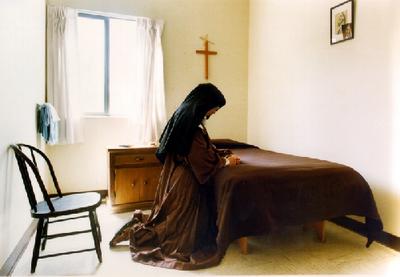Whether they are called priests or ministers, pastors or rabbis, some religious leaders do great good and some cause great harm.
While there are many, many religious leaders who do
great good, the headlines are too full of those who do great harm, especially the relative few who harm children or the handful who steal. There are also others whose personal moral failures have become serious obstacles.
Today’s
readings speak strongly against religious leaders who violate their vocations and they establish a high standard for those who would serve the Lord.
These readings thus provide guidance both for those among us who minister and also those among us who support the work of ministry.
* * * * *
The first reading (
Malachi 1:14b-2:2b, 8-10) is dramatic and clear: prophesying how even the good things of ministry turn sour for the unrighteous minister.
And now, O priests, this commandment is for you:
If you do not listen,
if you do not lay it to heart,
to give glory to my name, says the LORD of hosts,
I will send a curse upon you
and of your blessing I will make a curse.
If you think
that’s bad, the next verse (left out of today’s selection) is pungently vivid about the aftermath of unrighteous ministry.
Behold, I will rebuke your offspring,
and spread dung upon your faces,
the dung of your offerings,
and I will put you out of my presence.What did these priests, these ministers, do that was so bad? They no longer followed the example and the doctrine of their exemplar and ancestor Levi.
My covenant with him was one of life and peace;
fear I put in him, and he feared me,
and stood in awe of my name.
True doctrine was in his mouth,
and no dishonesty was found upon his lips;
He walked with me in integrity and in uprightness,
and turned many away from evil.
For the lips of the priest are to keep knowledge,
and instruction is to be sought from his mouth,
because he is the messenger of the LORD of hosts.
But you have turned aside from the way,
and have caused many to falter by your instruction.
The greatest failure of the unrighteous ministers is thus a failure in their responsibility as teachers of God’s word. Even the notorious scribes and Pharisees were more reliable than
that, as we hear in today’s Gospel (
Matthew 23:1-12):
The scribes and the Pharisees
have taken their seat on the chair of Moses.
Therefore, do and observe
all things whatsoever they tell you...
The most critical role of all ministers is their role as teachers of God’s word. Faithful communication of God's word must therefore be the most fundamental and serious focus of all those among us who are engaged in ministry.
Even priests, who may see their role as primarily a sacramental one, must have the same primary focus, as the Church makes clear:
The People of God are joined together primarily by the word of the living God. And rightfully they expect this from their priests. Since no one can be saved who does not first believe, priests, as co-workers with their bishops, have the primary duty of proclaiming the Gospel of God to all.Presbyterorum Ordinis, 4
It is vital for all of us to support the ministers among us in this task of faithfully communicating the word of God: to express appreciation when they are faithful and substantive and, when they are not, to pray for them and to dialogue with them respectfully and encouragingly (
cf Matthew 18:15-17).
* * * * *
Doctrinal correctness, of course, is not enough. Both the first reading and the Gospel also speak to the importance of the minister’s personal morality.
On the one hand, Levi walked with the Lord “
in integrity and in uprightness.” On the other hand, with regard to the scribes and the Pharisees, our Lord warns us
But do not follow their example.
For they preach but they do not practice.Obviously, personal rectitude helps reinforce God’s message of righteousness, whereas moral failings contradict the very message with which the minister is entrusted and thus damage even the most doctrinally pure preaching.
Thus, ministers must all strive to “practice what they preach” and “to walk the walk they talk.” Even “private” sins must be avoided as much as possible, because even where there is no victim or scandal as such, the strain on the minister’s integrity can be insidiously damaging.
That being said, we need to be realistic about human nature and about the Gospel. We are
all sinners.
None of us are perfect: not even ministers. Ordained or not, we are
all in need of God’s grace and mercy through our Lord and Savior Jesus Christ.
Imperfect as we are, clergy and laity, we are called to be instruments of that grace and mercy to each other as we struggle up the road toward perfection.
In cases of serious sin where there is unrepentance or (as with serial pedophiles) the risks of recidivism are grave, the flock must be protected: public ministry cannot continue and a new life must be found.
In other cases, however, like the father of the prodigal son, we should keep our hands outstretched to those who are truly repentant and who, like the rest of us, are faithfully struggling up the road to the perfection to which Christ calls us.
* * * * *
Another common theme in today’s readings can be summed up by the words “It’s not about YOU.”
The scribes and the Pharisees prove the classic bad example: it’s all about THEM.
They love places of honor at banquets,
seats of honor in synagogues,
greetings in marketplaces,
and the salutation 'Rabbi.'St. Paul, on the other hand, in today’s second reading (
1 Thessalonians 2:7b-9, 13) maintains the right perspective: he had worked hard and had spoken in the face of struggles, but it’s not about HIM – it’s about
GOD.
In receiving the word of God from hearing us,
you received not a human word
but, as it truly is, the word of God,
which is now at work in you who believe.This is an important lesson for any minister – especially the gifted or popular ones – it should never be about
you, it should always be about
God.
Likewise, ministers should always remember that any title of honor must always point back to God: you are a pastor only insofar as you share in the work of the Good Shepherd; you are a teacher or “doctor” in the Church only insofar as you participate in the teaching of Christ; you are called “Father” only insofar as you are an instrument of God begetting spiritual life in Christ (
cf 1 Cor. 4:15).
Everyone, ordained or otherwise, needs to keep this perspective: it’s not about this minister or that minister or even about ourselves – especially since all of us are sinners – everything comes from Christ and goes back to Christ, no matter how good or bad any of us might be.
* * * * *
Today’s readings, however, offer more than just bad examples of ministry and religious leadership. In the passage from which today’s second reading is taken, St. Paul gives an example of Christian ministry that abounds in love, beauty, strength, and faithfulness.
Rather, we were gentle among you,
as a nursing mother cares for her children.
With such affection for you,
we were determined to share with you
not only the gospel of God,
but our very selves as well,
so dearly beloved had you become to us.
You recall, brothers, our toil and drudgery.
Working night and day
in order not to burden any of you,
we proclaimed to you the gospel of God.
You are witnesses, and so is God,
how devoutly and justly and blamelessly
we behaved toward you believers.
As you know, we treated each one of you
as a father treats his children,
exhorting and encouraging you
and insisting that you conduct yourselves
as worthy of the God
who calls you into his kingdom and glory.
It is a great example for all who minister within the Church.
It is a great example for all of us in helping each other in Christ.
 A Penitent Blogger
A Penitent Blogger








